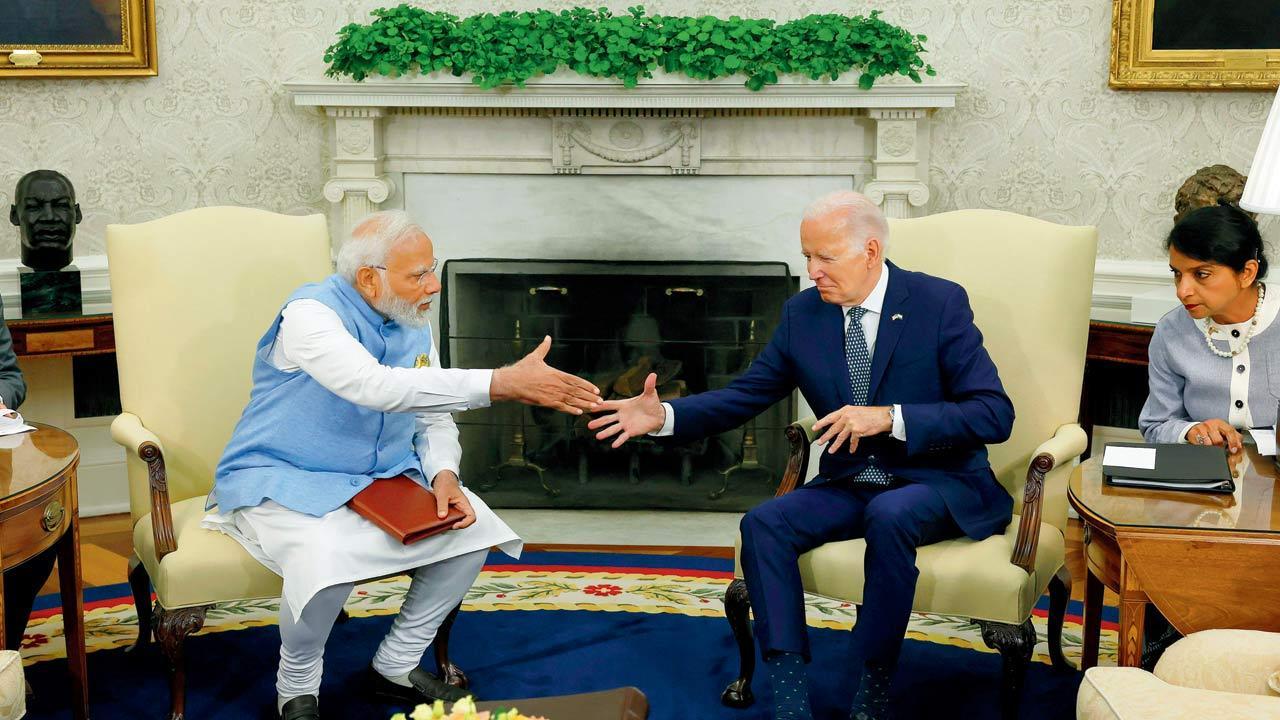“When you interpret for Prime Minister Modi, his passion must be reflected in your voice”

Gurdeep Chawla sits at right as U.S. President Joe Biden and Indian Prime Minister Narendra Modi meet in the Oval Office at the White House in Washington, DC, June 22, 2023. Images/Getty Images
Your browser does not support HTML5 audio
I was doing a Masters in English Literature at St. Stephen’s College in 1988 when my sister read in the newspaper that the Indian Parliament was looking for translators. I jokingly applied for the position, took the exam and got the job. But I knew I would only work for a few weeks as I was pursuing a Masters degree. After completing my Masters, I returned to the job and was planning to quit because I was so keen to pass the Civil Services Examination.
That day, I saw a gentleman sitting with headphones on, reading a Hindi newsletter and talking to himself. He told me that he had come for a test for an interpreter position. I asked him how he was able to listen and speak at the same time. He said, “Oh, you have to use your brain too.”
He took me to the visitors’ gallery in Parliament and I listened. I was amazed. It was magical. They asked me to try it. I was nervous; I was 22 and the others were in their 40s. When everyone applauded and said great job, I realised I had a talent for it.
Fortunately, the Lok Sabha was holding an interpreter’s examination and I decided to take part in it. For self-training, I asked family members to read parliamentary speeches and I interpreted them as they read. I passed the examination and after a year of training, I was offered a job as a parliamentary interpreter. It was a big deal and well paid. One of my first trips was to India with a Russian delegation in 1991.
During the 1994 general elections, Prannoy Roy (a senior journalist) called me to the NDTV office. I interpreted for the experts who were analysing the election polls in Hindi.
When I started working in Parliament, VP Singh was the Prime Minister of India. I remember some landmark moments. In 1991, (PM) Chandra Shekhar made his last speech and finally said, “I resign…” I was interpreting for him. That was difficult to hear. It’s different in Parliament – sometimes people hurl curses and you must not hesitate. My seniors had told me that if you hesitate, the person to whom the curse is directed will not understand. How will they react? For example, (senior Congressman) P Chidambaram does not understand Hindi, so he always has the interpreter’s headphones on.
As an interpreter, you are the speaker’s alter ego. Your interpretation must have the same character, emotion and verve (as the original speech). No matter how bad the (spoken) swear word is, you must have enough words in your repertoire to convey it correctly.
When I moved to California to be with my husband in 1996, I also worked there as an interpreter because someone suggested that my experience would make me a good fit for the State Department. I gave it a try and in 2008, when my security clearance was upgraded, I traveled to India with US President Barack Obama. That was my big break. Now I interpret for the President of the United States as a contractor for the US State Department.
When Prime Minister Modi arrived in America in 2014 to deliver his first speech to the United Nations, they called me. I prepared very well – I watched all his speeches because I had to learn how he thinks – I had to anticipate in some ways what his next sentence would be. It was a 50-minute speech; I had goosebumps. It went very well. When you interpret for Prime Minister Modi, you have to have his passion reflected in your voice.
Later, I worked with Canadian Prime Minister Stephen J. Harper. During one flight, Harper boasted, “Oh, we have a great interpreter!” And Modi ji said, “Yes, she is from my parliament!”
The other memorable compliment came from the late Sushma Swaraj when she said, “Gurdeep meri awaaz hai.”
The trick is to stick to your word. You have to convey the speaker’s thoughts and be honest about your task. It’s also very sensitive work; whatever happens in the room stays in the room. We don’t come home and talk about it.
Related Posts

Boston’s WHERE IS ELA has found a new sound on “I Wanna Ride”

